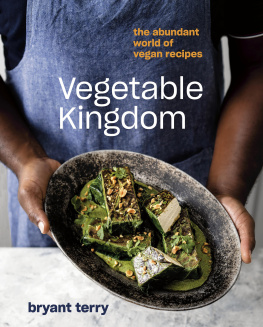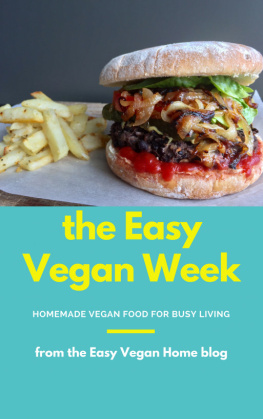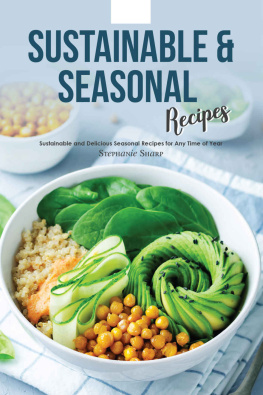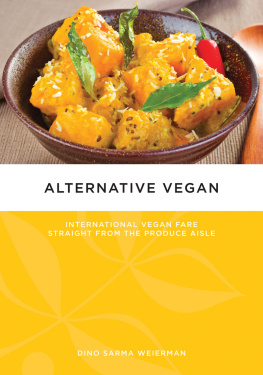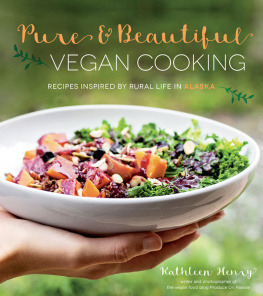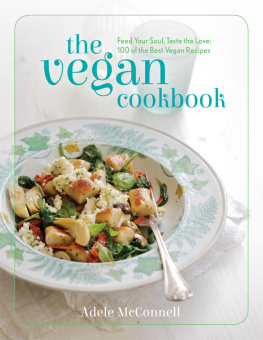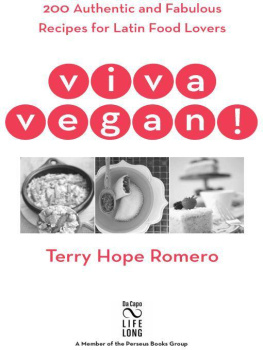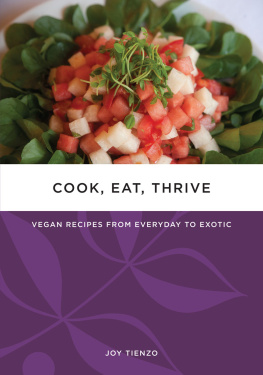PROPS FOR
Bryant Terrys The Inspired Vegan
Bryant Terry is a culinary muse unlike any other. Of course, this book is filled with delicious, unexpected, and exciting recipes. But theyre seasoned with uplifting history, powerful music, beautiful ideas, sweet memories, and deep compassion. Bryants great gift is to reconnect us with the radical joy that food brings, making inspired vegans out of us all.
Raj Patel, author of The Value of Nothing and Stuffed and Starved
Bryant Terry has crafted a cuisine that is vivid, colorful, and uniquely American. He seamlessly blends the food traditions of the African diaspora with the farm-to-table freshness of Northern California. Sweet and sensuous, rich and refreshing, his mouthwatering dishes jump off the page.
Louisa Shafia, chef and author of
Lucid Food: Cooking for an Eco-Conscious Life
I stopped by Bryant Terrys place in Oakland when he was writing The Inspired Vegan. I found greens in the garden, something delicious in the kitchen, and in him, an inspiring commitment to bettering the world by bringing people together around soulful food. Reading this book is like spending the afternoon with him all over again.
Josh Viertel, president, Slow Food USA
In The Inspired Vegan, Bryant Terrys exuberant, healthful, and playful remix of African American, West African, Chinese, and other cultural cuisines is deftly matched by his bold progressive thinking and storytelling.
Didi Emmons, chef and author of Wild Flavors
The Inspired Vegan is like a personal journal where readers get an intimate perspective into Bryants inspired world. He strives to build awareness, culture, and community through food, and this latest book does so in a simply delicious manner.
Aida Mollenkamp, Food Writer and Chef
The Inspired Vegan is incredibly dope. This beautiful book not only changes the way we see and taste food, it changes the way we see and taste the world. The Inspired Vegan, like gumbo, is a delicious collage of ingredients: recipes, art, culture, inspiration, and social change. Enlightening, uplifting, and hungering, The Inspired Vegan is a must read and a must taste.
MK Asante, author, filmmaker, professor
The Inspired Vegan melts my heart. Im in love with Terrys beautifully crafted book, and readers will enjoy healthful and tasty treats, such as Sweet Potato-Cornmeal Drop Biscuits (to the tune of Steal Away by Mahalia Jackson), and agave-sweetened Mexican Chocolate Pudding, inspired by Cynthia Wells Colores de la Vida. This book will stay on your kitchen shelves for years.
A. Breeze Harper, The Sistah Vegan Project
the
inspired
vegan
Books by
Bryant Terry
Vegan Soul Kitchen: Fresh, Healthy,
and Creative African-American Cuisine
Grub: Ideas for an Urban Organic Kitchen
(with Anna Lapp)
the
inspired
vegan
seasonal ingredients
creative recipes
mouthwatering menus
Bryant Terry

A MEMBER OF PERSEUS BOOKS GROUP
Copyright 2012 by Bryant Terry
Photographs by Jennifer Martin (California: cover, lifestyle, kitchen prep, and recipes).
Food styling by Karen Shinto.
Prop styling by Dani Fisher.
All rights reserved. No part of this publication may be reproduced, stored in a retrieval system, or transmitted, in any form or by any means, electronic, mechanical, photocopying, recording, or otherwise, without the prior written permission of the publisher. For information, address Da Capo Press, 44 Farnsworth Street, 3rd Floor, Boston, MA 02210.
Designed by Timm Bryson
Set in 11 point Arno Pro by the Perseus Books Group
Cataloging-in-Publication data for this book is available from the Library of Congress.
First Da Capo Press edition 2012
ISBN 978-0-7382-1375-0
ISBN 978-0-7382-1547-1 (e-book)
Published by Da Capo Press
A Member of the Perseus Books Group
www.dacapopress.com
Note: The information in this book is true and complete to the best of our knowledge. This book is intended only as an informative guide for those wishing to know more about health issues. In no way is this book intended to replace, countermand, or conflict with the advice given to you by your own physician. The ultimate decision concerning care should be made between you and your doctor. We strongly recommend you follow his or her advice. Information in this book is general and is offered with no guarantees on the part of the authors or Da Capo Press. The authors and publisher disclaim all liability in connection with the use of this book. The names and identifying details of people associated with events described in this book have been changed. Any similarity to actual persons is coincidental.
Da Capo Press books are available at special discounts for bulk purchases in the U.S. by corporations, institutions, and other organizations. For more information, please contact the Special Markets Department at the Perseus Books Group, 2300 Chestnut Street, Suite 200, Philadelphia, PA 19103, or call (800) 810-4145, ext. 5000, or e-mail .
10 9 8 7 6 5 4 3 2 1
For Jidan and Mila
(R.I.P. Maholi)
contents
start
In 2007, shortly after moving to the Bay Area from Brooklyn, I lived across the street from Lake Merritta beautiful body of water adjacent to downtown Oakland. Every day of the week, I had easy access to a plethora of healthy food options. My apartment was just two blocks from a well-stocked, independently owned health food store that offered a variety of organic, fresh fruits and vegetables, as well as bulk grains and beans. I could also walk to the new 40,000-square-foot Whole Foods Market, which sold everything imaginable (insert side-eye). On Saturdays, Id stroll to the Grand Lake Farmers Market, which hosted forty-four local farmers, thirty specialty food purveyors, and a handful of local artisans.
I lived in a food paradisewhich made it difficult to fathom how there could be a food desert (as it is often described) so close by. Just about a mile and a half from Whole Foods is the community of West Oakland, which in 2007 was home to fifty-three liquor stores and not one full-service supermarket. Let me repeat that: Liquor stores: 53 / Supermarkets: 0. Many of the thirty thousand residents (primarily African American) living in that neighborhood did not own cars, and it was incredibly difficult for them to travel to other parts of Oakland, or to Emeryville or Berkeley to shop for food. As a result, folks relied upon the liquor/convenience stores to meet their grocery needs. It goes without saying that those stores sold very few, if any, fresh fruits and vegetables, and what food they did offer tended to be processed.
Unfortunately, across the country, there are far too many communities like West Oakland, where people are denied the basic human right to healthful, safe, affordable, and culturally appropriate food. Not surprisingly, these communities have some of the highest rates of obesity and diet-related illnesses in the nation. To combat this injustice, a number of organizations, projects, and individuals have been working tirelessly to create community-based solutions for producing food in an affordable, sustainable, and eco-friendly manner while teaching people how to select ingredients and prepare wholesome meals for themselves and their families. Following on my background as a grassroots activist, I see my work as a chef and author contributing to one of the most hopeful movements of the twenty-first centuryfood justice!
Next page

![Bryant Terry - Black Food : Stories, Art, and Recipes from Across the African Diaspora [A Cookbook]](/uploads/posts/book/300359/thumbs/bryant-terry-black-food-stories-art-and.jpg)
